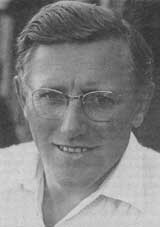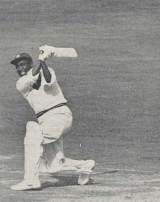Griffith, Buller and four overs which proved nothing
Colin Cowdrey
|
|

|
Cricket has been extremely fortunate--and I like to think it is a tribute to the game and those closely linked to it--with its modern sponsors. It is not so long ago that I remember the misgiving with which such projects were being anticipated, Yet, first Gillette with their Knock-out Competition, and now Rothmans in backing the International Cavaliers teams on Sundays and the Rest of the World matches at Scarborough and Lord's, have made really worthwhile contributions. The Knock-out Cup is here to stay, and widely acclaimed, but it will require another year for this second venture to become established. It is an admirable concept, with infinite possibilities.
Some ten years ago Rothmans saw the game of cricket, with its precarious financial structure, as the sort of outlet for their activity which appealed to them. The first task was to find some-one outside their own business, closely associated with cricket, yet holding no official position in M.C.C. or on a County Committee. Thus it has been in conjunction with Mr. Harvey, a man whose life is sport and those who participate, that the whole operation has been planned and implemented.
Starting in the smallest and quite unobtrusive way, they provide a helping hand behind the scenes from time to time. An indelicate intrusion at this stage might have brought everything to a halt. But let it he said at once that they were, and still are, first and foremost cricket de¬votees. This has made the vital difference, just as it has done with Gillette. Rothmans recognised the need for help with cricketers' bene¬fits, assisting with their Sunday matches, printing of programmes and publicity. They answered the problem of transport for touring teams within this country, providing a van to cope with the luggage and a fleet of cars whenever an emergency arose.
Two short winter tours have been undertaken to Jamaica, providing a wonderful opportunity to blood any young promising cricketers. This may well become an annual event. They have seized the opportunity of breaking into Sunday cricket with their televised International Cavaliers matches (swelling the funds of a bene¬ficiary or a county club on each occa¬sion) thereby giving M.C.C. and the Advisory County Committee some in¬dication as to the public reaction to competitive cricket on a Sunday.
Finally, in this jet age, their pipe dreams of collecting a World XI to challenge an All England XI have materialised. thus providing the most fascinating spectacle that an English cricket crowd could hope to see.
|
|

|
Their undivided aim has been, it seems, that cricket and the welfare of cricketers should he enhanced. One can only hope that from a business point of view they feel themselves sufficiently rewarded and, in this re¬spect, it is gratifying to hear that they may bring a Rest of the World team to England again next summer.
It is typical of Rothmans' approach to this enterprise that they took no part in selecting the teams, preferring to invest that responsibility in the host of television viewers by means of a Radio Times poll. The response to this gesture was remarkable proof of the interest aroused: in fact. almost 40.000 replied.
Out of all this twelve players were summoned to represent the World Xl. The Nawab of Pataudi, the Indian captain and captain-elect of Sussex. stood down from the first match but came in for Barlow (South Africa) at Lord's. It was fitting that Reid (New Zealand) was accorded the honour of leading the side. W. Grout was the only Australian and it was disappoint¬ing that N. C. O'Neill should decline the invitation, in protest at the select-ion of C. Griffith (West Indies) whose bowling action he considered unfair. This apart, it comprised a superbly balanced side, brilliant in the field.
The selection of the England teams was made by A. B. Sellers, T. N. Pearce, T. F. Bailey and 1.. F. G. Ames under the auspices of M.C.C. Edrich and Russell were given a match each, likewise Murray and Parks, Titmus and Allen. Knight and Cartwright. 'I Trueman and Statham, Rumsey and Larter. In the end, 'Trueman was required by Yorkshire for a Knock-out match, and with Dexter still not quite fit enough from his leg injury, the presence of these two was greatly missed. Reid won the toss at Scarborough and South Africa and West Indies, in the shape of Barlow and Hunte, were to he seen in unison as they opened the innings for the World Xl. Miracu¬lously, the wicket was completely dry at one end but a little damp at the other. In the poor light all the World batsmen were subdued by the English howling. F. E. Rumsey worked up a good pace but it was B. R. Knight who worried them most, moving the ball off the seam. Hunte and Barlow ran beautifully between the wickets and provided a good start, but to the great disappointment of the huge crowd, Sobers and Kanhai never really got going. Surprisingly, without a belligerent partnership from C. Bland and C. Griffith. the World XI might have been dismissed for little more than 100 runs. Bad light and rain brought proceedings to an end about teatime and we had to wait until the second day and a delayed start before the much heralded appearance of Griffith partnering Hall with the new ball.
Edrich. Barber and later Partin with-stood the onslaught manfully, for Sobers is no mean change howler by any standards. Hall on his long run. and howling flat out, was a fearsome proposition for John Edrich, in pro¬cess of recovering from his nasty acci¬dent at the hands of P. Pollock at Lord's. lie came through with flying colours and it will have served as a very valuable tonic for the winter ahead in Australia. When Barber was out attempting to fend oil a vicious bouncer from Griffith (not at this juncture under J. S. Buller's scrutiny. I hasten to add) Parfitt came in to play one of the best innings of his career, standing up and driving the fast bowlers straight with great power.
Just before rain came on the second day, to bring a premature end to yet another day's play, Reid created a tremendous stir by calling upon Griffith to howl down the slope and rain full view of Buller for the first time. The whole atmosphere had been heightened by E. It Dexter's out-spoken comments on the television during the morning, declaring Griffith a thrower with every hall he delivered. Griffith produced four overs at a very gentle, medium pace, which neither Buller nor anyone else who was judging with the naked eye could have questioned.
Smith declared overnight. in the hopes that Reid would declare, leaving England to chase a target. Hunte and Barlow shared a most exciting hundred partnership in blazing sunshine, but it was all too good to last. Reid declared and the crowd looked forward to seeing the England batsmen battling against the clock against Hall and Griffith, but. once again, the rain had the last say.
|
|

|
Sadly, the second match at Lord's was completely disrupted by the water-logged conditions. There was no play at all on the first day and half way through the second day it became apparent that the ground was never going to be fit for a match of this kind. it would have been too much of a disappointment to have abandoned it altogether, for it was something akin to a Royal Command Performance. with the house agog. only to find that the curtain could not be lifted. In a 70 over match both teams disported themselves as best they could in the conditions, but to no consequence. The public's appetite had been whetted by the flashes from Scarborough and this was a desperate disappointment. We have to wait another year, hoping the sun will choose to shine in September.
The match at Lord's having ended in mid-afternoon, it was announced that a single-wicket competition would be held between Sobers, Kanhai, Griffith and an English player to be nominated by the England captain: D. A. Allen was chosen. A prize of £50 was offered by Rothmans to the winner, and each innings was to be limited to six overs. Allen (19 in 4.2 overs) was beaten by Griffith (24 not out in 5.1 overs) and Sobers (41 not out in 6 overs) beat Kanhai (20 in 2.2 overs).
In the final, Griffith was brilliantly caught at slip by Parfitt for 6 in the second over, and Sobers, after scoring a single, won the match and the £50 prize with a glorious straight six--a fitting end to the season at Lord's.

